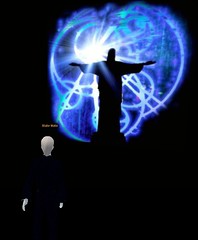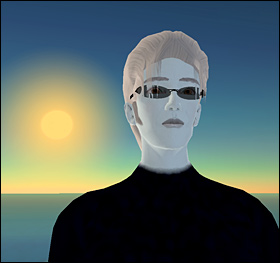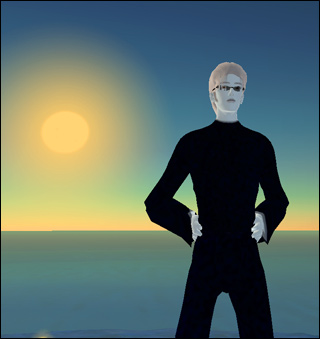A Virtual Religion
Blake Wake, my avatar in Second
Life, is becoming more and more interested
in the spiritual aspects of virtual space. Is it possible
that spirituality may be mediated via computer networks and 3d graphics the
way it is via text, the plastic jesus, and tel evangelism? Maybe even more
profoundly because it is already non-physical and disembodied? (That is assuming
spirituality requires these two things).
 The
first premise is that if physical communities are on the decline and people
are looking to virtual spaces for community and spending more and more time
there, there needs to be a spiritual component. The second premise is that
virtual worlds are a new kind of place, related to but different in kind than
real space. Our relationship to the spiritual there is also different. Simply
importing real world religions into the space is somehow unsatisfactory. Is
it possible to create a new religion, or a major variant, in virtual space?
Is it inevitable?
The
first premise is that if physical communities are on the decline and people
are looking to virtual spaces for community and spending more and more time
there, there needs to be a spiritual component. The second premise is that
virtual worlds are a new kind of place, related to but different in kind than
real space. Our relationship to the spiritual there is also different. Simply
importing real world religions into the space is somehow unsatisfactory. Is
it possible to create a new religion, or a major variant, in virtual space?
Is it inevitable?
One of the problems is that many people in virtual worlds are there to forget
about the real world and any spiritual matters they may otherwise be concerned
with. And there is a tendency of many involved with technology to be fairly
secular, with religions instincts channeled into the wondrous magic of the
latest gadgets and the next wave of advancements.
Blake Wake went exploring what religious areas that do exist in Second Life
recently. Early results with photos and comments are in the Metaverse set on flickr.
Posted by Dean Terry at 12:01 AM
Comments & Permalink
(1)
Thus Spake Blake Wake
 I've
been working on my avatar in Second
Life. His name is Blake Wake (and he just bought a virtual island from
Anshe Chung for
some reason).
I've
been working on my avatar in Second
Life. His name is Blake Wake (and he just bought a virtual island from
Anshe Chung for
some reason).
There
are two basic approaches to this. One is to develop a character that more or
less mimics your real life persona. The purpose of this is to represent yourself
in 3pointd space for often pragmatic reasons: the journalist or entrepreneur
that needs to maintain a level of transparency and develop trusted relationships
that transcend a particular virtual world.
The other approach - one which I
find much more compelling - is to develop an alternate persona. The could-have-been
or the wish-I could or simply a doppelganger with better hair and fewer skin
imperfections.
In my case I am fancying the idea of developing an avatar or two that represent
a set of ideas particular to the virtual world. Unfortunately most of the ideas
in virtual worlds are shovelware - ideas shoveled from the real world into
virtual space. Some have argued this is jut what we should do - create virtual
version of real world people, events, and transactions. Certainly there is
a role for this, but I'm more interested in the imaginative possibilities of
these spaces.
There are two areas that are of interest. One is architecture and the other
is religion. On the architecture front Blake Wake is, er, I am working on
a "theory of virtual architecture." Or maybe it is a theory of place
making. Either way, someone needs to do something. Most of the building going
on in Second Life mimics real life structures. Now much of this is due to the
fact that SL has modeled itself on the real world, even down to the problematic
land ownership structure. Yes there is still an up and a down, and avatars
look like humans, but you can fly and teleport yourself anywhere instantly.
your buildings can float. Right now coming up with a "theory" is
basically ridiculous considering the size of SL. But this is an early adopter
playground and at some point in the near future there will be a metaverse and
people will build places. The question is what to take from thousands of years
of place making and what to jettison and develop new ideas appropriate for
the varying rules of virtual spaces. Stay tuned for Blake Wake's ideas.
 The other area of interest is religion, and many of the comments above apply
here as well. If you think that SL and the metaverse should mostly be a place
that RE-presents (read presents again) the real world, then having churches
and praying to Jesus makes some kind of sense - even though there
are so many layers of mediation going on it is befuddling. On the other hand
- and its way to early for this - there amy be a kind of religious experience
that can only be mediated through virtual space. If not only, then substantially.
A virtual church is no more abstract and no less symbolic than a real one.
More on this later as well.
The other area of interest is religion, and many of the comments above apply
here as well. If you think that SL and the metaverse should mostly be a place
that RE-presents (read presents again) the real world, then having churches
and praying to Jesus makes some kind of sense - even though there
are so many layers of mediation going on it is befuddling. On the other hand
- and its way to early for this - there amy be a kind of religious experience
that can only be mediated through virtual space. If not only, then substantially.
A virtual church is no more abstract and no less symbolic than a real one.
More on this later as well.
Of course the contrast I present here is in many cases much more of a blur.
The typical MySpace or Facebook profile is in some sense an avatar, and a selective,
online version of the person. The question is whether avatars like Blake Wake,
insofar as I decide to distinguish him from my real life person, are substantial,
meaningful entities. Right now they are attached to games and worlds like Second
Life, but this will change.
Posted by Dean Terry at 09:49 PM
Comments & Permalink
(2)